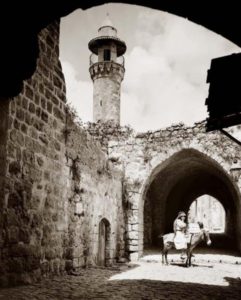Bringing Order to the City, Hannah Brown, Jerusalem Post, Oct 30, 2007.
 Jerusalem was an isolated, backward town, with no electricity or even running water when the British captured it in December 1917, toward the First World War. This began a 30-year period during which the British ruled the city, a period documented in the fascinating new documentary, Till We Have Built Jerusalem.
Jerusalem was an isolated, backward town, with no electricity or even running water when the British captured it in December 1917, toward the First World War. This began a 30-year period during which the British ruled the city, a period documented in the fascinating new documentary, Till We Have Built Jerusalem.
The film, written and researched by Yaakov Gross and directed by Eli Cohen, will be screened at the 22nd Israeli Film Festival in New York on October 30 and November 8. It was shown this summer at the Jerusalem Film Festival and will be shown in 50 places throughout the world on the 90th anniversary of the day the British General Allenby arrived in Jerusalem on December 9, 1917. It will also be broadcast on Israeli television on a date soon to be announced.
While many filmmakers whose documentaries were screened at the Jerusalem Film Festival this year focused on such trendy subjects as gender identity, Gross, a documentary filmmaker and author, felt a need to reexamine the British era in Jerusalem, because, “a lot of the public is ignorant of what changes took place during these years. But the developments of these years are what made Jerusalem the city it is today… A lot of the conflicts the country is facing today come out of what went on during that period.”
By and large, until the British arrived, Jerusalem was not a modern city at all, a condition the film documents with archival material that the filmmakers assembled. Gross says he could have put the film together out of archival materials alone, but in the end, the filmmakers chose known historians including Sir Martin Gilbert and Prof. Yehoshua Ben Arieh to narrate the film. These experts are Israeli, British and Palestinian academics who put the events depicted in the film into a historical context.
One of the points the filmmakers make is that while the Zionists and British had a troubled history during this period, the British came into the situation with deep and positive feelings for Israel and particularly Jerusalem. Gross points to the quote from British Prime Minister Lloyd George, who said in December 1917, that Jerusalem was “a Christmas present for the British nation.”
At first, quite a few of the Zionists may have seen the British presence as a gift, too. Says Gross- “Until the British came, the Zionists had tried to build a center in Jerusalem, but there were problems. The Turks closed every Zionist enterprise. Luntz and Ben Yehuda’s printing press closed. Ben Yehuda’s newspaper closed.” The British army, although it eventually came into conflict with the Zionists, “brought order to the city. The British wanted quiet,” Gross says.
Part of this quiet, they knew, would come from getting jobs and commercial activities to move to Jerusalem. They also organized the building and operation of a sewage system and an electric power system. The influence of the vision that the British had for the city is still felt to this day, Gross points out, although often in ways that even many of its residents are unaware of. The film examines the postal system (among other things) as one example of this enduring influence. “Before the British came in, there was no one postal system. All the factions had their own postage, their own systems. The British unified it, and created the red mailboxes and the postal symbol that is still used,” Gross says.
But in spite of the order the British brought to certain aspects of Jerusalem life, their continuing presence became the focus of much conflict. The British found themselves unprepared to have to mediate between the Jews and the Arabs. “Both sides didn’t want order, they didn’t want each other and they didn’t want the British,” says Gross.
A great deal of the current power structure on both sides in Jerusalem in particular and more generally throughout Israel can be traced back to how the British chose to rule, the filmmakers point out. “The Palestinian national dream came with the British,” says Gross, noting that they promoted the fiercely nationalistic Amin al-Husseini to the position of Mufti, a decision that was to have far-reaching repercussions even into the 21st century.
Till We Have Built Jerusalem is a rich, fact-filled film that covers a great deal of material in its one-hour running time and will be much appreciated by anyone who lives in Jerusalem or loves the city. Gross sees it as one chapter in a series of films about the period. “The perspective of the film is to explain the new Middle East and the problem of Jerusalem,” says Gross. Meron Benvenisti, an author and former deputy mayor of Jerusalem, who is one of the experts interviewed in the film, puts it slightly differently- “If they [the British] hadn’t been in there [in Jerusalem] for 30 years, the state wouldn’t have been established.”



